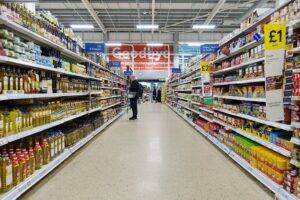Shop price inflation in the UK has dropped to its lowest rate in nearly three years, returning to what experts describe as “normal levels.”
Figures from the British Retail Consortium (BRC) and NielsenIQ reveal that the annual rate of increase in shop prices fell to 0.6% in May, down from 0.8% in April.
Over the past month, shop prices have edged up by 0.2%, compared to a 0.3% decline in April. Food price inflation has continued to ease, decreasing to 3.2% annually from 3.4% the previous month. Monthly food prices have risen by 0.2%, down from a 0.5% increase in April.
Several items have experienced a slowdown in inflation in May, with non-food shop prices falling by 0.8% over the year, bringing the headline rate to its lowest level since November 2021.
Mike Watkins, Head of Retailer and Business Insight at NielsenIQ, commented, “After several months of falling input prices, we are now seeing food inflation stabilise and retailers continue to pass on price cuts to shoppers. While inflationary pressure has eased and there is some improvement in shopper sentiment, the unseasonable weather has dampened retail sales, so lower prices are likely to continue, driven by promotional activity.”
According to the Office for National Statistics (ONS), retail sales dropped by 2.3% over the month to April, marking the sharpest fall this year.
This fifth consecutive month of declining shop price inflation provides a boost to the Conservative election campaign. Prime Minister Rishi Sunak aims to convince voters to back the Tories on July 4 by highlighting the steady economic recovery since he took office in October 2022.
Official estimates from the ONS showed that overall inflation fell to 2.3% in April from 3.2% previously, which contributed to Sunak’s decision to call an early election. However, this decline was slower than economists had anticipated.
The Resolution Foundation, a think tank, has noted that the current parliament will be the first in history where average household living standards have declined. Although the economy exited recession at the start of this year, gross domestic product (GDP) per person has continued to decline historically.
Interest rates have reached a 16-year high of 5.25%, and the Bank of England is not expected to lower them until after the election due to concerns about persistent price pressures in the services industry.
Read more:
Shop Price Inflation Falls to Lowest Level Since November 2021

